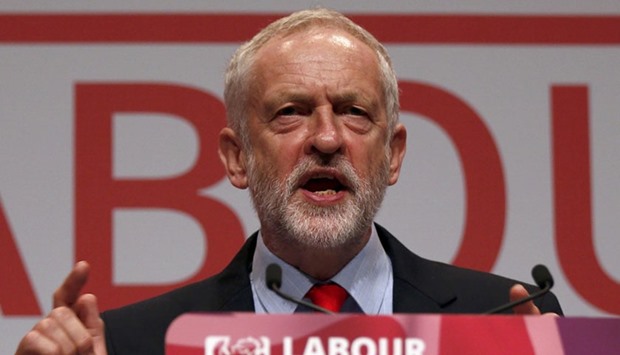Supporters in Liverpool, northwest England, leapt to their feet cheering as the 67-year-old was confirmed winner with 61.8 percent of the vote among party members and supporters, easily defeating rival MP Owen Smith.
In his acceptance speech, Corbyn urged unity, pledging to "wipe the slate clean" after accusations of bullying by supporters and fears of an irreparable breach between left-wingers and centrists.
"We have much more in common than that which divides us. As far as I'm concerned, let's wipe that slate clean from today and get on with the work we've got to do as a party together," he said.
Corbyn increased his vote share from the 59.5 percent he received on his initial election last year, when he put an anti-austerity, anti-nuclear agenda at the forefront of British politics for the first time in a generation.
His commanding victory is a major blow to Labour MPs who rebelled against him after June's Brexit vote, many of them moderates who believe his socialist views will never be accepted by most voters.
Corbyn was accused of lacklustre campaigning for Britain staying in the European Union, and many now fear he cannot provide the necessary opposition as Prime Minister Theresa May's Conservatives negotiate the terms of withdrawal.
Corbyn claims he has energised many people who felt left behind by mainstream politics, drawing comparisons with anti-establishment movements across Europe like Greece's Syriza.
Labour's membership now stands at 650,000, up from just 200,000 18 months ago, which Corbyn says will eventually drive the party to power.
But analysts note Labour is lagging far behind the Tories in the polls and Corbyn's personal approval ratings are at rock bottom.
"Labour is not going to win any elections in the near future," said Anand Menon, professor of European politics at Kings College London.
Messianic appeal
Speaking shortly before the result, home affairs spokesman Andy Burnham said Labour's "war of attrition" must now stop but urged Corbyn to build support among the public, not just party activists.
"We cannot measure our success by the size of the membership or indeed the size of the rallies that we are holding," he told BBC radio.
Corbyn has an almost messianic appeal among his supporters, including in the 18,000-strong campaign group Momentum.
Opponents accuse Momentum of trying to infiltrate the party with far-left activists and say its members have bullied Corbyn opponents.
At a Momentum event near the party conference in Liverpool, jubilant activists greeted news of the leadership result with cheers and chants of "Corbyn! Corbyn! Corbyn!"
"Every time they challenge him, he will only get more support, because he is telling the truth," said Dee Coombes, 68.
But former Labour foreign secretary David Miliband, a centrist narrowly beaten to the party leadership by his brother Ed in 2010, wrote in the New Statesman magazine this week: "We have not been further from power since the 1930s."
Row over top team
More than 40 MPs resigned from Corbyn's shadow cabinet in the rebellion earlier this year and while reports suggest a dozen may return, many prominent figures are likely to stay away.
Corbyn ally and finance spokesman John McDonnell said those who did not want to serve "formally" could "take a lead on issues on the backbenches".
In a key test of what lies ahead, the party executive will discuss later Saturday a proposal to give Labour lawmakers a vote on members of the shadow cabinet, a move that the leadership is resisting.
MPs will also be pressing for greater assurances that Corbyn's supporters will now not try to deselect those of them who have been hostile to his leadership.
Few of Corbyn's critics were present to watch him crowned once again.
"I voted for Owen Smith," said former Labour foreign secretary Margaret Beckett, looking bleak.

